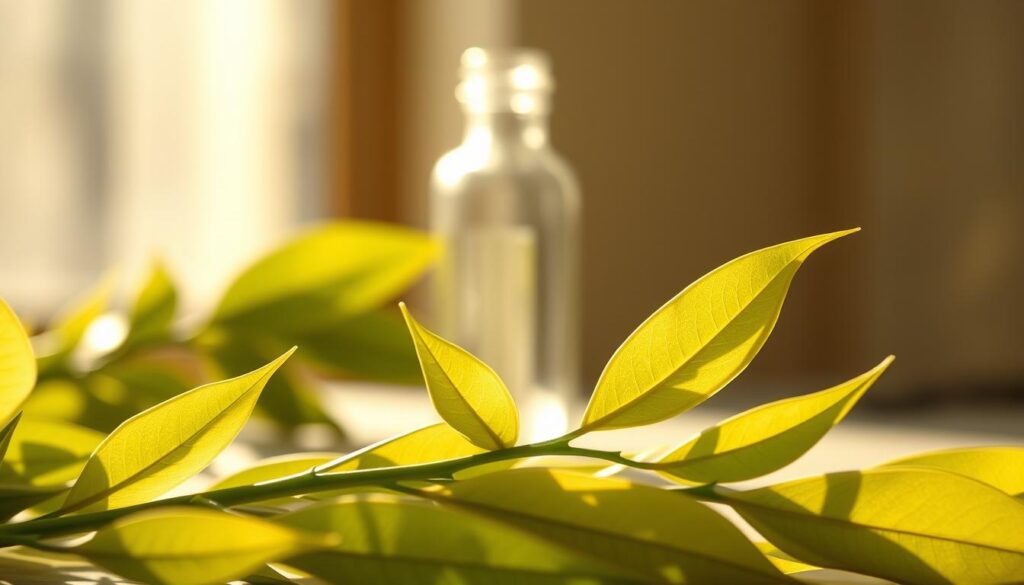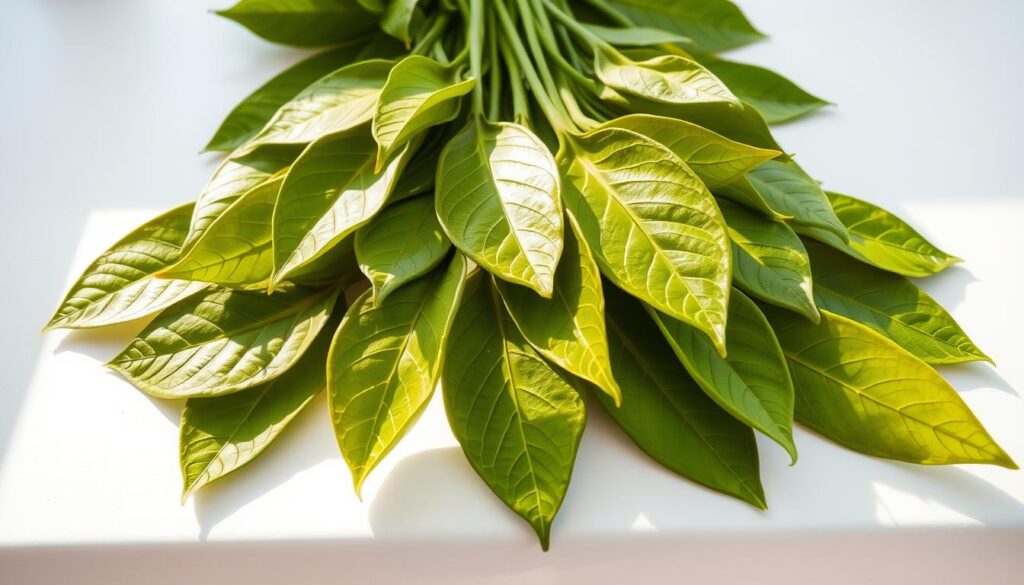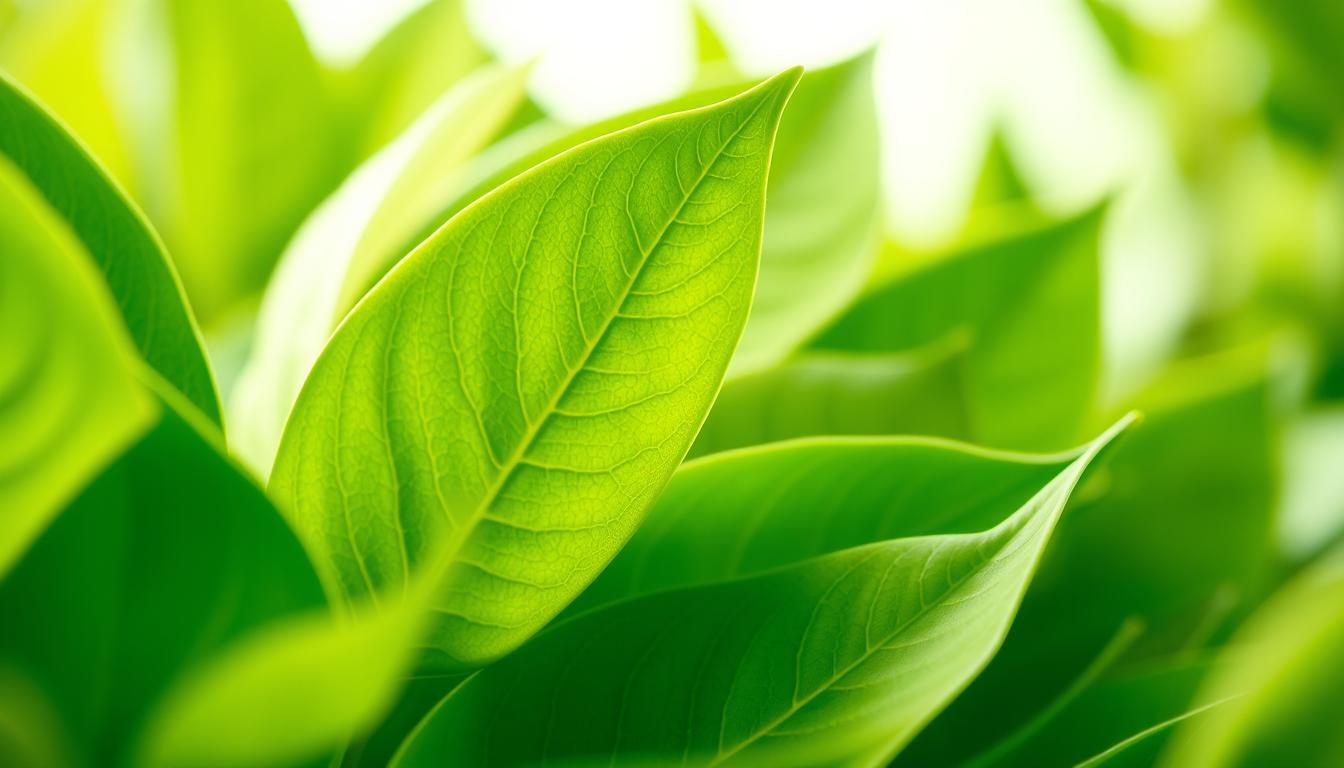Imagine finding a secret ingredient in your kitchen that can change your health and cooking. The lemon leaf is more than just a pretty garnish. It’s packed with flavor and nutrition, ready to boost your natural health.
Culinary experts and health fans are discovering lemon leaves as a key ingredient. They mix traditional cooking with holistic wellness. These leaves add a burst of citrus flavor and offer health benefits that might surprise you.
Exploring lemon leaves can change how you see this simple herb. We’ll show how it can make your cooking better, improve your health, and add a new twist to your cooking and wellness.
Table of Contents
Understanding Lemon Leaf: Nature’s Aromatic Wonder
Explore the amazing world of lemon leaves. They are a key herbal tea ingredient that adds natural fragrance and botanical wonder to your wellness routine. These leaves have a rich history and amazing properties that go beyond cooking.
Origins and Botanical Roots
Lemon verbena, known as Aloysia triphylla, comes from South America. It’s found in Argentina, Chile, and Peru. The plant loves warm places and has leaves that smell like citrus when you touch or crush them.
- Native to South American countries
- Grows best in warm, subtropical environments
- Produces leaves with intense citrus fragrance
Chemical Composition and Unique Properties
Lemon verbena leaves are full of important compounds. They are great in herbal teas. These leaves have antioxidants that fight off harmful free radicals, helping keep cells healthy.
Traditional Cultural Uses
Lemon verbena is used all over the world. It’s in traditional medicine and cooking. Indigenous groups used it for its digestive benefits and calming effects.
Lemon verbena: A natural fragrance that connects tradition with modern wellness.
Looking for a refreshing herbal tea or natural health solutions? Lemon leaves take you on a journey into botanical wellness.
The Natural Power of Citrus Foliage Benefits
Discover the amazing power of citrus foliage for natural wellness. Lemon leaves are more than just a garnish. They are packed with health-boosting properties that support your well-being.
Lemon leaves have a unique mix of compounds. Research shows they are full of antioxidants that protect your body. Compared to lemongrass and lemon balm, lemon leaves offer a wide range of health benefits.
- Rich in essential oils that support immune function
- Potential to improve digestive health
- Natural stress-reduction properties
- Supports cardiovascular wellness
Your body can benefit from citrus foliage in many ways. Lemon leaves are rich in:
- Vitamin C: Approximately 53 mg per 100 grams
- Powerful antioxidants that combat free radicals
- Essential oils with therapeutic potential
Lemongrass and lemon balm have their benefits. But lemon leaves offer complete natural health support. They can reduce stress by up to 54%, making them a great addition to your wellness routine.
Nature’s most powerful remedies often come from the most unexpected sources – and lemon leaves are a prime example of this wisdom.
Looking to improve your cooking or natural health? Lemon leaves are a powerful option for your well-being.
Essential Nutrients Found in Lemon Leaf
Explore the nutritional wonders of lemon leaves. They are a treasure trove of organic aromatherapy and aromatic herbs. These vibrant green leaves are more than just a garnish. They are packed with essential nutrients that boost your health.
Recent research shows lemon leaves are a nutritional powerhouse. A 2023 study by the National Library of Medicine found their bioactive compounds are impressive.
Vitamin and Mineral Powerhouse
Lemon leaves are a nutritional goldmine. They offer a wide range of essential vitamins and minerals:
- Vitamin C: Supports immune function
- Vitamin A: Promotes eye and skin health
- B-complex vitamins: Enhances energy metabolism
- Potassium: Supports heart and muscle function
- Calcium: Strengthens bones and teeth
Bioactive Compound Breakdown
The magic of lemon leaves lies in their bioactive compounds. Citral, limonene, and geraniol are key players. They work together to provide health benefits.
Antioxidant Protection
Lemon leaves are known for their antioxidant capabilities. The compounds in these aromatic herbs fight free radicals. This may reduce the risk of cellular damage and support health. Research suggests these antioxidants help prevent chronic diseases and support your body’s defense.
One lemon can provide about half of the recommended daily value of vitamin C. This makes lemon leaves a natural health booster.
Culinary Applications of Fresh Lemon Leaves
Fresh lemon leaves are a secret weapon in gourmet cooking. They turn simple dishes into amazing culinary experiences. These leaves add a unique citrusy flavor that can take your cooking to new levels. They are versatile garnishes that add a vibrant, zesty taste to many recipes.
Exploring culinary uses, you’ll find many exciting ways to use lemon leaves:
- Infuse marinades with lemon leaf essence for poultry, seafood, and pork dishes
- Create aromatic herbal tea ingredients by steeping fresh leaves
- Use as a fragrant garnish for grilled meats and vegetable platters
- Add depth to sauces and dressings with their bright citrus notes
Professional chefs suggest drying lemon leaves to keep their flavor all year. You can grind them into a fine powder or store them in airtight containers. When using fresh leaves, take them out before serving. They can be tough and fibrous.
Try new things with lemon leaves. Add them to baked goods like muffins or cookies for a citrus surprise. You can also make lemon leaf-infused honey or use them in cocktails and drinks.
Pro tip: Fresh lemon leaves are most potent when used immediately after picking, capturing their most vibrant flavors.
From making fruit salads better to creating unique desserts, lemon leaves are a game-changer. They will amaze and satisfy your taste buds.
Brewing the Perfect Lemon Leaf Tea
Explore the world of herbal teas with lemon verbena. Making the perfect lemon leaf tea is an art. It’s simple yet offers complex flavors.
Preparing lemon leaf tea needs care and a love for natural tastes. The right steps can turn simple leaves into a wonderful drink. It will please your senses and help your health.
Essential Preparation Steps
- Select fresh or dried lemon leaves from a reliable source
- Use filtered water for optimal taste
- Choose your preferred brewing method
- Prepare your tea accessories
Optimal Steeping Techniques
| Tea Type | Water Temperature | Steeping Time |
|---|---|---|
| Fresh Lemon Leaf | 212°F (100°C) | 3-5 minutes |
| Dried Lemon Leaf | 205°F (96°C) | 4-6 minutes |
Flavor Enhancement Tips
Make your lemon verbena tea even better with these ideas:
- Add raw honey for natural sweetness
- Incorporate fresh mint leaves
- Sprinkle a pinch of cinnamon
- Experiment with ginger slices
Learning the art of brewing brings out the best flavors and health benefits. Every sip takes you on a journey of flavor and well-being.
Aromatherapy and Essential Oil Uses

Discover the power of lemon leaf essential oils. These oils are a game-changer for your wellness routine. They offer a unique sensory experience that’s more than just a scent.
Learn how these oils can boost your mood and health. They do this through special aromatherapy techniques:
- Stress reduction and mood enhancement
- Potential immune system support
- Sleep quality improvement
- Natural relaxation method
A 2023 study showed lemon leaf oils might help with health issues. Test tube research also found they could fight bacteria. This could add more benefits.
| Application Method | Recommended Usage | Potential Benefits |
|---|---|---|
| Diffusion | 3-5 drops per session | Stress relief, mood enhancement |
| Topical Application | Diluted with carrier oil | Skin health, potential anti-inflammatory effects |
| Inhalation | Up to 7 drops per 2 cups boiling water | Respiratory support, relaxation |
When using lemon leaf essential oils, always do a patch test. Also, talk to a healthcare professional. The FDA doesn’t check essential oil quality. So, pick trusted sources.
Safety first: Essential oils are highly concentrated and should never be ingested.
Starting your journey with lemon leaf essential oils can change your life. It’s a chance to add a holistic wellness experience to your life.
Natural Remedies and Medicinal Properties
Lemon balm and other aromatic herbs are full of natural healing power. They offer many health benefits that can boost your overall wellness in amazing ways.
Looking into lemon leaves’ medicinal properties shows many health perks. These can add to what traditional medicine offers.
Anti-inflammatory Benefits
Lemon leaves have compounds that may cut down body inflammation. The antioxidants in these herbs can:
- Lower chronic inflammation markers
- Help with joint health
- Lessen the risk of inflammatory diseases
Digestive Health Support
Your digestive system can get a big boost from lemon leaves’ natural properties. Essential nutrients in these leaves may:
- Boost digestive enzyme production
- Lessen bloating and discomfort
- Encourage healthy gut function
Stress Relief Applications
Lemon balm’s calming effects make it great for stress relief. Its special chemicals can:
- Lower anxiety symptoms
- Help you relax
- Boost mental health
Always talk to a healthcare professional before using herbal remedies as treatment.
Adding these aromatic herbs to your wellness routine can help you naturally support your health. They can aid in managing various bodily functions.
Proper Storage and Preservation Methods

Storing aromatic herbs like lemon leaves needs careful attention. Your citrus foliage stays fresh and flavorful when stored right. It’s important to know how to keep fresh and dried lemon leaves.
Fresh Lemon Leaf Storage Techniques
For fresh lemon leaves, keep them in the fridge. Wrap them in a damp paper towel and put them in a sealed container. This keeps them moist and prevents them from wilting. Store them in the crisper drawer for the best freshness.
- Store in an airtight container
- Use a damp paper towel to prevent drying
- Refrigerate immediately after harvesting
- Consume within 5-7 days for best quality
Drying Lemon Leaves
Drying is an excellent method for preserving your herbs. Harvest lemon leaves in the early morning after dew has dried. Dry them just before the flower buds open for the best flavor.
| Drying Method | Temperature | Duration |
|---|---|---|
| Dehydrator | 95°F – 115°F | 1-4 hours |
| Air Drying | Room Temperature | 5-7 days |
| Hanging Method | Cool, Dry Area | 7-10 days |
Keep dried lemon leaves in an airtight container away from light and moisture. Dried leaves stay potent for months. This lets you enjoy their flavor in cooking and wellness.
- Store in a dark, cool location
- Use glass or ceramic containers
- Check for moisture regularly
- Replace every 6-12 months
Dried herbs are stronger than fresh ones. Use less when cooking to get the right flavor.
Conclusion
Our journey through citrus foliage has shown us the amazing uses of lemon leaves. They are more than just a food ingredient. They bring health, flavor, and wellness to our lives.
Lemon leaves are versatile, from your kitchen to your wellness cabinet. They can make tea, flavor dishes, or help with natural remedies. These leaves from the Citrus limon plant add taste and nutrition to your day.
Adding lemon leaves to your daily life opens up new ways to heal and cook. Their antioxidants, essential oils, and unique taste make them valuable. Your adventure with citrus foliage is just starting. Let’s see how these leaves can make your life better.
Make sure to get fresh, high-quality lemon leaves. Always talk to a healthcare expert before using them for medicine. Your journey to natural wellness is exciting and unique.
FAQ
What are lemon leaves, and where do they come from?
Lemon leaves come from the citrus lemon plant. They grow on lemon trees in warm places. These leaves have a strong citrus smell and are used in cooking and medicine.
Are lemon leaves safe to consume?
Yes, lemon leaves are safe to eat if they are organic and clean. Make sure they don’t have pesticides. Always talk to a doctor before trying new foods, especially if you have allergies.
How can I use lemon leaves in cooking?
You can use lemon leaves in many ways. Try them as garnishes, in marinades, or in soups. They add a nice citrus flavor to food.
What health benefits do lemon leaves offer?
Lemon leaves are good for your health. They boost your immune system, help with digestion, and protect against disease. They also have vitamins and minerals that help you stay healthy.
How do I brew lemon leaf tea?
To make lemon leaf tea, use fresh or dried leaves. Steep them in hot water for 5-7 minutes, then strain. You can add honey or mint for extra flavor. Try different steeping times to find your favorite taste.
Can lemon leaves be used in aromatherapy?
Yes! Lemon leaf essential oils are great for diffusers and beauty products. They help relax and reduce stress, making your space feel calm.
How should I store lemon leaves?
Keep fresh lemon leaves in an airtight container in the fridge for a week. Dry them for longer storage. Keep them in a sealed container stored in a cool, dark place. This way, they stay flavorful for months.
Are there any alternatives to lemon leaves?
Yes, you can use lemongrass, lemon balm, or lemon verbena instead. They all have a citrusy taste and can be used in cooking and medicine, depending on what you need.
Can lemon leaves help with stress relief?
Lemon leaves have compounds that may help with stress and anxiety. Their scent and potential benefits can help you relax and feel better emotionally.

